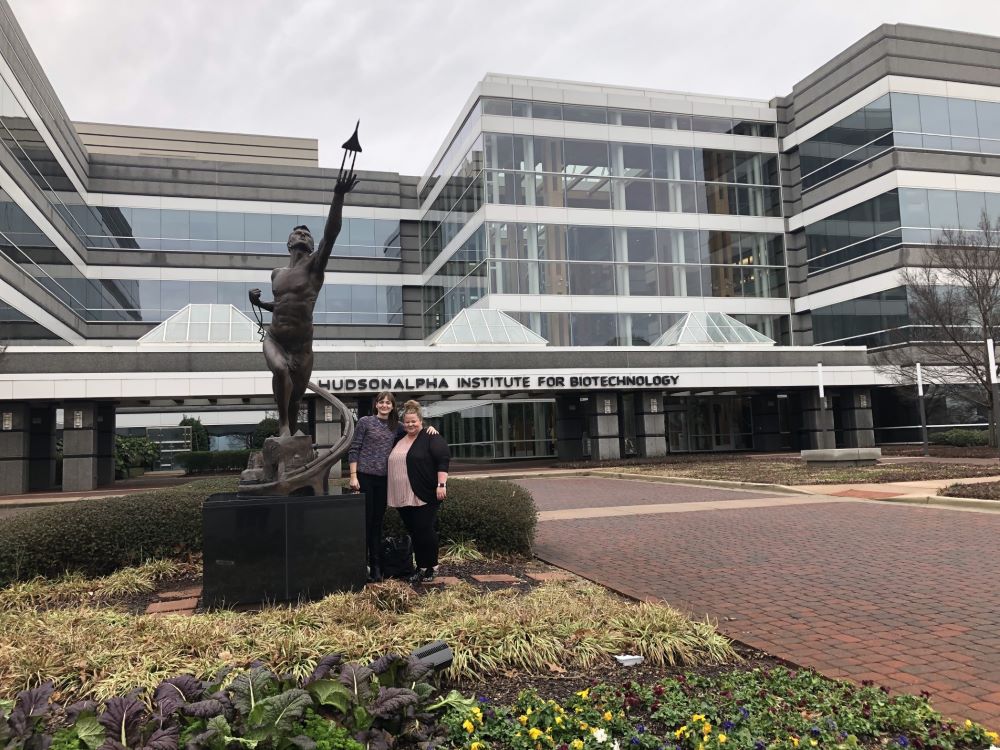Medical Genetics
- Department of Pediatrics Home
- Educational Programs
-
Divisions
- Pediatric Divisions
- Allergy, Asthma and Immunology
- Ambulatory Pediatrics
- Cardiology
- Child Development
- Critical Care
- Emergency Medicine
- Endocrinology
- Forensic Medicine
- Gastroenterology
- General Pediatrics
- Hematology and Oncology
- Infectious Diseases
- Medical Genetics
- Newborn Medicine
- Nephrology
- Neurology
- Palliative Medicine
- Pulmonary
- Rheumatology
- Research
Our Involvement in Clinical Research
Our team is actively involved in clinical research with the hopes of improving resources care for the patients fo Mississippi.
Our Publications
Leah Olewiler, MS, CGC
Michelle Tharp, DNP, FNP-BC
Bethany Robinette, DNP, MSN, FNP-C
Mauricio de Castro Pretelt, MD, FACMG
Paulo Borjas-Mendoza, MD
Baby Magnolia (ongoing)
The MCHD has a broad focus on building cutting-edge technology and big data analytics to bring a deeper understanding to the health and disease continuum. The MCHD seeks to serve as umbrella program to initiate and promote molecular approaches across basic, clinical and translational research. For example, a newly established project- Project Baby Magnolia will work to bring genomic medicine to critically ill infants and children through the application of rapid whole genome sequencing. This important program is only made possible through new and innovative omics technology (Core B) and computational biology capabilities (Core C) established and supported by the COBRE.
PopSeq (ongoing)
Genome sequencing (GS) is increasingly conducted in large-scale human research studies, creating questions for investigators about whether and how to return genetic findings. The American College of Medical Genetics and Genomics (ACMG) recommends that physicians report secondary findings in at least 72 actionable genes (the ACMG72) whenever clinical GS is ordered. In an effort to address ethical concerns of investigators and the expectations of participants, ACMG recommendations are being applied by many investigators to guide genomic return of results (gRoR) in research biobanks and longitudinal studies. Critical knowledge gaps exist about the benefits and harms of gRoR on research participants and the impact on investigators, how to efficiently identify and confirm such variants, and how to provide accurate estimates about their penetrance, particularly among participants in population-based studies and in underrepresented minorities. Empirical data on these questions are urgently needed to guide protocol development for research participants sequenced by the NHLBI Trans-Omics for Precision Medicine (TOPMed) Program and to inform the All of Us Research Program (AoURP) within the Precision Medicine Initiative, which plans to offer 1 million participants access to their genomic data and to some interpreted results. Recently, 7603 individuals in the Framingham Heart Study (FHS) and the Jackson Heart Study (JHS) were sequenced as part of TOPMed, of whom 2885 and 2674 (total of 5559) respectively are alive. PopSeq aims to return genomic information in these populations and begin the gROR with the ACMG59. The study will collect outcomes data that will lay the groundwork for return of results for variants in additional genes. It will generate crucial data for other population studies and biobanks, will inform future efforts to scale the labor-intensive process of variant classification, and will allow testing of a new method to begin to estimate penetrance among populations unselected for family history. The specific aims of this project are to (1) return clinically actionable genomic results to participants and track outcomes among the living participants, (2) improve high-throughput methods for identifying valid pathogenic variation, and (3) evaluate aggregate penetrance for Mendelian diseases.
- Citation/Taken from: The PopSeq Project – Genomes to People (genomes2people.org)
SouthSeq (concluded)

In SouthSeq we performed whole-genome sequencing on newborns suspected to have genetic disorders and developed and tested return of results mechanisms to expand access to genetic testing to diverse, especially historically underserved, communities.
South-Seq was a collaborative effort among researchers and clinicians at the University of Alabama at Birmingham/Children’s of Alabama (Birmingham, AL, USA), University of Mississippi Medical Center (Jackson, MS, USA), Woman’s Hospital (Baton Rouge, LA, USA), University of Louisville (Louisville, KY, USA), and Children’s Hospital New Orleans (New Orleans, LA, USA). We enrolled newborns suspected to have genetic disorders being cared for in nurseries in these locations that were enriched for minority, rural, and underserved patients. We conducted whole-genome sequencing to identify genetic variants that are contributing to the observed symptoms and which may provide diagnostic and prognostic information for the probands and their parents. We engaged individuals from key stakeholder groups to design, implement, and tested a return of results mechanism that did not require a medical geneticist or genetic counselor. Our major goals were to expand the reach of genomic testing to diverse communities in a safe, effective, and equitable manner.
- Outcome information (study completed)- Bowling KM, Thompson ML, Finnila CR, Hiatt SM, Latner DR, Amaral MD, Lawlor JMJ, East KM, Cochran ME, Greve V, Kelley WV, Gray DE, Felker SA, Meddaugh H, Cannon A, Luedecke A, Jackson KE, Hendon LG, Janani HM, Johnston M, Merin LA, Deans SL, Tuura C, Williams H, Laborde K, Neu MB, Patrick-Esteve J, Hurst ACE, Kandasamy J, Carlo W, Brothers KB, Kirmse BM, Savich R, Superneau D, Spedale SB, Knight SJ, Barsh GS, Korf BR, Cooper GM. Genome sequencing as a first-line diagnostic test for hospitalized infants. Genet Med. 2022 Apr;24(4):851-861. doi: 10.1016/j.gim.2021.11.020. Epub 2021 Nov 27. PMID: 34930662; PMCID: PMC8995345.


